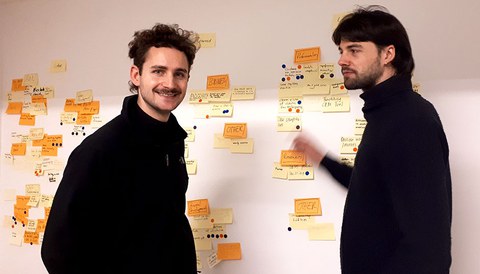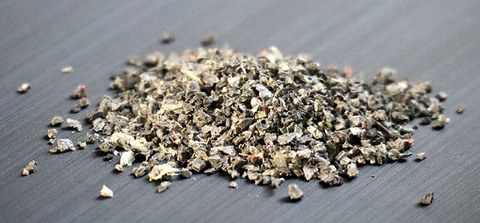Apr 11, 2023
Award-winning: Using plastic flakes to create sustainable roads
Dagmar Möbius
Maximilian Redwitz and Emil Weber both studied Psychology (BSc) at TUD. Today, they are working together in a startup that won the 2022 Berlin Brandenburg Innovation Award. Their concept: sustainable asphalt.
“The story doesn’t start at TU Dresden,” Maximilian Redwitz remembers with a smile. It was here that he and his classmate Emil Weber earned their Bachlor’s degrees in psychology. They then moved to Zeppelin University in Friedrichshafen, where one of them completed an MBA in Business, the other one an MA in Communication, Culture and Management.

Maximilian Redwitz and Emil Weber in front of a wall of post-its from the previous team meeting.
From volunteering to a performance-enhancing asphalt additive
In southern Germany, both volunteered at a non-profit organization to work in Nepal. When an enourmous earthquake devastated the country in 2015, they launched a fundraising campaign with other students. Owing to the overwhelming response, schools were supported and water centers were built. But plastic pollution in Nepal was the catalyst that drove them in a different direction. “We wanted to make a difference and reuse plastic in such a way that it regains its value,” explains Maximilian Redwitz. The problem is: Plastic and packaging are difficult to separate and are therefore often just incinerated. Launched in 2019 as a project within the NGO NIDISI, they developed EcoFlakes in a research collaboration with the Fraunhofer Institute for Chemical Technology (ICT) and the University of Kassel. The CO2-reducing flakes, made from otherwise non-recyclable plastic, are mixed into road asphalt. “This increases asphalt longevity and saves costs as a result,” says Emil Weber.
The value of self-awareness and mental health
300 million tons of asphalt is used every year. The two men produced the first ten tons of this promising building material themselves - in a garage in Berlin-Zehlendorf. They delivered the material themselves for their first pilot section in Potsdam using a rented truck. “We hadn’t even founded the company at that time, but wanted to do everything ourselves,” says the ecopals co-founder and CEO Maximilian Redwitz. In cooperation with the second co-founder, Jonas Varga, he manages the company, which was officially established in 2021. Emil Weber is responsible for communication. Today, the Berlin Mitte-based startup has twelve employees. “We are a diverse, international team, without the need for a quota. It just ended up that way, and each person brought in the skills we needed,” says Maximilian Redwitz. As an entrepreneur mental health in society is also an issue close to his heart.

EcoFlakes are mixed into road asphalt.
No stage fright at the awards ceremony
“We didn’t apply for lots of different awards,” says communication expert Emil Weber. “Prizes for the sake of prizes isn’t our thing.” On the day of the 2022 Berlin Brandenburg Innovation Award Ceremony, Jonas Varga and Maximilian Redwitz had met with a client in Thuringia. The train was delayed. “We were going to struggle to make it on time,” they both thought. And didn't get their hopes up. When they finally got there - 45 minutes late - a video of their startup was being presented on the big screen. “There was some really big names there, much bigger than us,” Maximilian Redwitz still marvels today. “And all of a sudden, we were called up. It was a really nice surprise, and we didn’t have any stage fright.“ They didn’t expect that ecopals GmbH would be one of the prize winners from a total of 155 applicants. The jury commended the following:
“The company has developed technology to convert non-recyclable waste plastic into a qualitatively homogeneous, performance-enhancing bitumen substitute. Ecoflakes reduce CO2 emissions in road construction by 30%, increase the longevity of asphalt, replace parts of bitumen and reduce material costs by 20%.”
“The composition of the individual elements is what is new to the market, not necessarily the technology,” clarifies Maximilian Redwitz. There have been accusations that young people are “dumping garbage into the street.” To set this straight: The innovative asphalt mixture contains only 0.5% recycled plastic flakes, but even this small amount doubles its longevity. “The road construction industry is straightforward and conservative,” says Emil Weber. It’s always the same with anything new, people need to be convinced: socially, economically and ecologically. Everyone at the company is aware that Ecoflakes “are not the solution to the plastic problem, but a means to combat its symptoms.” That’s why the startup is conducting research into other sustainable products. The manufacturing is handled by industrial partners.
The Faculty of Civil Engineering at TU Dresden has included samples of the innovative asphalt in a study comparing the long-term effects of different recycling products. It will be at least twelve years before the final results are available - that’s how long the study will be carried out. “For my entrepreneurial spirit, that’s a very long time,” laughs Maximilian Redwitz.
Contact:
ecopals GmbH
Tel.: +49 160 1164701
